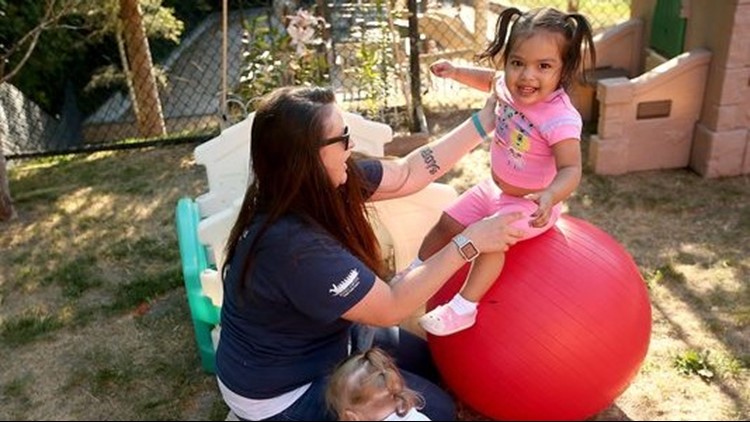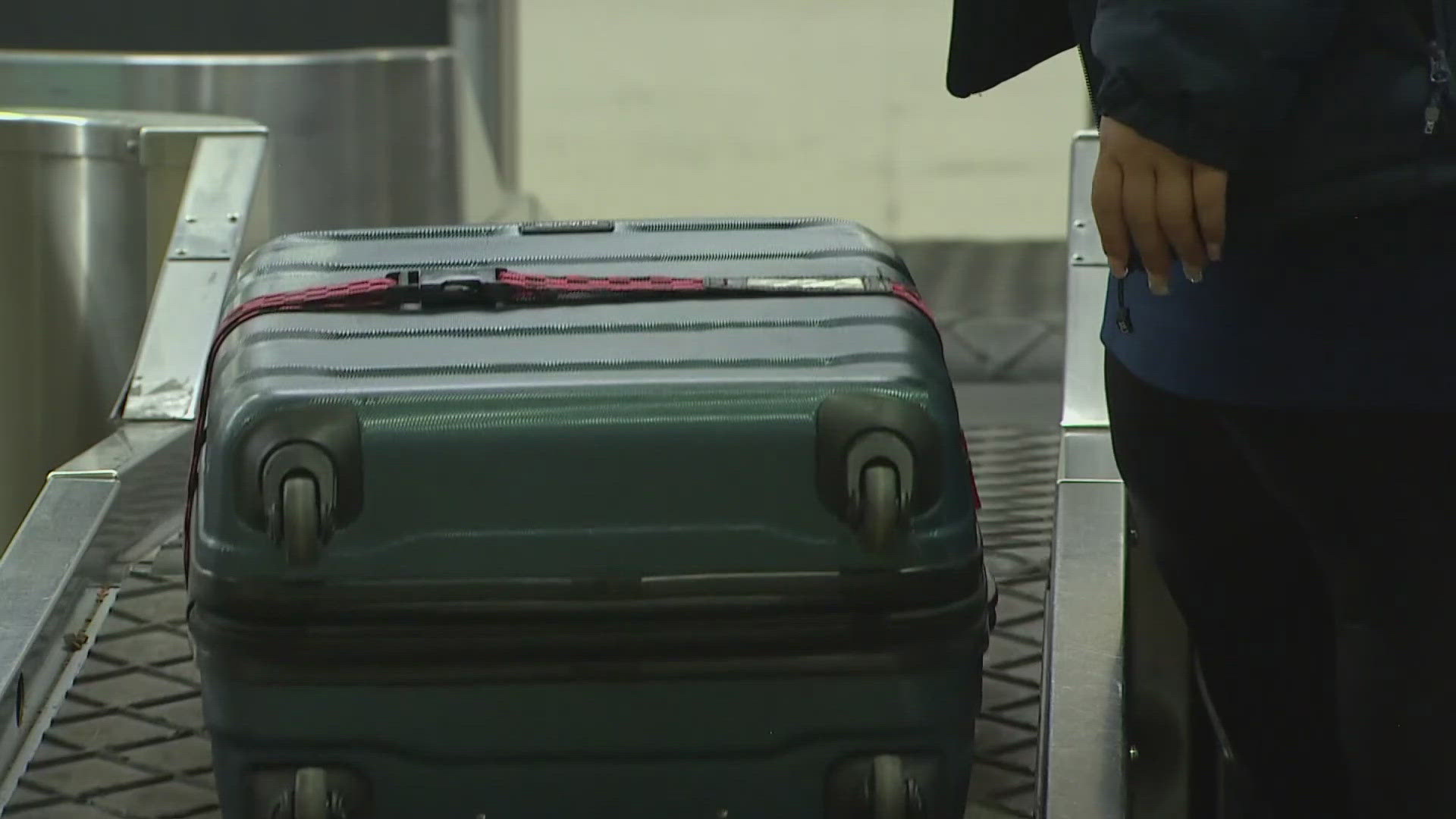Christina's Childcare in Port Orchard used to have a backyard play structure, but not anymore.
Owner Christina McClure recently moved her home-based child-care business to a new house with more interior space, and the play structure didn't come along. McClure was tired of having to remove the swings during business hours because the structure was half an inch closer to the fence than state licensing regulations allowed.
"Half an inch. You can't give me that?" she asked.
McClure, who pays a full-time assistant, makes just more than $20,000 a year for a job that requires well more than eight hours a day. She loves being her own boss, loves doing art projects with the littles, and she loves being at home for her own kids (who count toward her quota although they don't generate revenue). What she doesn't love is the level of scrutiny to which she and other state-licensed childcare providers are subject.
McClure sees the need for regulations. "This is someone's child. That being said, I understand and approve a lot of their rules, but there's a rule for a rule for a rule," she said.
The rules are about to get more stringent.
Childcare workers will need college credit
The state's Department of Early Learning — now part of the Department of Children, Youth and Families — is wrapping up a major revision of regulations intended to improve the quality of care in child-care centers and licensed child-care homes. The new rules — outlined in a 104-page document on DEL's website — follow a nationwide trend toward child-care that goes far beyond babysitting, with the goal that children during the formative years from birth through age 5 receive developmentally appropriate educational opportunities.
In Kitsap County, some child-care providers are worried about the impact of a new requirement that staff in child-care centers and licensed homes must earn college credit for "early childhood education certificates" authorized by the state.
There are three levels of certification for workers based on their responsibilities within the center or licensed care home. The new regulations go into effect in 2019. Workers will have five years to earn the minimum required number of credits, ranging from 12 for assistant teachers and those in similar positions to 47 for center directors and assistant directors. Home-care licensees will need an initial 12 credits, followed by eight more credits, equivalent to a center's "lead teacher" requirements.
The rules pertaining to certification are still under negotiation to establish whether and how "equivalencies" like previous training and experience might apply.
Concerns for workforce retention
Julie Schroath, the owner of Creative Kids Learning Center in Port Orchard, thinks the new certification requirements will be hard on both child-care business owners and workers. Schroath, who is also communications coordinator for the Washington Childcare Centers Association, is among those advocating for "equivalencies" that would allow some flexibility as the new rules are implemented.
Child-care workers now are required to get training in basic competencies, but the cost and time needed are nothing like going to college. Schroath fears some of her longtime staff, who are trained but not highly educated, would likely leave if they're required to earn college credit to keep their job.
Some workers seeking a career in the field of early childhood education use entry-level positions to gain experience, Schroath said. She says requiring college credit for child-care workers at all levels effectively closes career paths for those who lack the means to pay tuition and could lead to a less diverse workforce.
"We don’t want to lose the workforce that’s doing an excellent job right now," she said. "All over the state you’ve got child-care employees and employers saying, 'What's going to happen to me?'"
Then there's the financial impact of the new regulations on center owners who have also been hit with new minimum wage requirements, Schroath said. She already compensates workers for additional training, and now, with higher minimum wages, her entire pay scale has bumped up.
"We struggle as costs rise because we don’t want to put the burden on parents," she said.
Olympic College helped develop training
The state's community colleges, including Olympic College, played a central role in designing the coursework covered in the new training. Washington state is seen as on the cutting edge of the movement to elevate the early childhood education workforce, said Gayle Dilling, who heads OC's early childhood program.
Requiring college credit for childcare workers above and beyond basic credentials is appropriate in light of the important work they do, Dilling said.
"A babysitter is a teenager you hire on a Friday night," she said. "Childcare is a qualified employee working in a safe environment caring for the social, emotional, physical and cognitive development of your child."
Olympic College stands to gain by increased enrollment in its early childhood programs. The college offers an associate degree, with the Sophia Bremer Child Development Center as the "learning lab." Starting in fall 2019, the college will partner with Western Washington University to offer a four-year early childhood degree.
Cynthia Savini, director of the Sophia Bremer center, welcomes the increased training requirements, which she says offer workers a better career pathway.
"My staff, they're all very excited with the prospect of being able to improve their education and improve the level of service they're providing for our kids," Savini said.
New training not a stretch for some
Kathy Larsen runs Bumble Bee Acres, a licensed home childcare center on a hobby farm in Kingston. Larsen was a little worried when an earlier version of the new rules prohibited children from digging in garden soil unless it was bagged, organic soil. There's no evidence that rule survived in the near-final draft of the new regulations.
Larsen gets that the state wants uniform standards for childcare providers, whether they're in a center or a home, but she hopes the new rules — the product of a huge response from stakeholders during the public comment period — result in a system that's safe yet allows for "unique" environments.
Larsen has no problem with the new training requirements, however. She is pursuing an associate degree in early childhood education, one of her personal goals. Larsen, a former Early Head Start teacher, has the extra training required of providers in that federal program, and she participates in Early Achievers, the state's voluntary quality rating system, which also requires additional training.
"There's not a lot of changes from what I was already doing, so I'm not too concerned," Larsen said. "It's not going to change my business or my childcare. I don’t feel it's going to be a hardship for me to do."
Seeking balance in child-care policy
State Sen. Christine Rolfes, vice chairwoman of the Senate's Early Learning and K-12 Education Committee, supports the move toward early learning opportunities, especially for low-income children who spend much of their day in child-care centers. She also acknowledged the burden added regulations have on providers.
"Sometimes a parent just needs a place where their kids are safe, particularly people working night shifts or needing part-time coverage, and in my opinion, we have not yet reached that place of balance in our requirements," Rolfes said. "This is something that I have been pushing for over the past few years. I’ve also been pushing the agency (DEL) to work to streamline licensing and reporting requirements with the federal government – which in military communities like ours is really important to the business owner."
Rolfes said caregivers she's heard from are less concerned about regulations than the shortfall of state subsidies, which haven't kept pace with the cost of care. Providers who take children on subsidies accept the financial loss, some of which is passed on to private-pay families.
The Early Learning and K-12 Education Committee has discussed caregiver wages, which Rolfes says are key to creating an equitable system for all, as well as the rising cost of child care for middle-class families who make too much to qualify for subsidies.
A task force looking at compensation will report its recommendations in December. Rolfes expects caregiver compensation to be a trending topic in the upcoming session. Reach her at Christine.Rolfes@leg.wa.gov. In the House of Representatives, contact Rep. Dan Griffey, Dan.Griffey@leg.wa.gov., who serves on the Early Learning and Human Services Committee.



